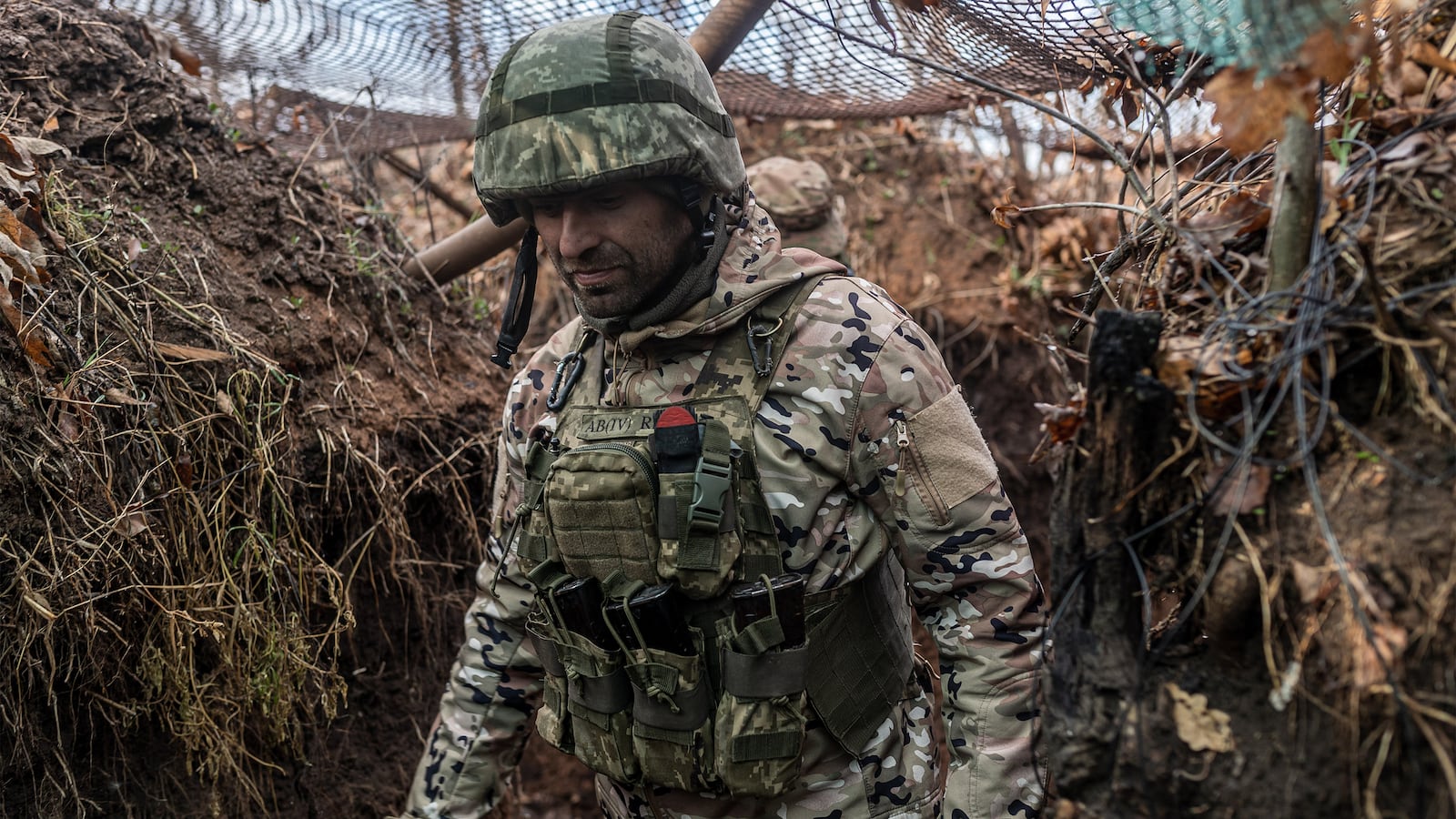Russia’s war in Ukraine has dominated the world’s attention since it began on Feb. 24, 2022. Western governments and journalists alike provided a constant flow of information and updates as the war unfolded, documenting every war crime, military gain, and loss. Leaders kept alive the unwavering support for Kyiv’s fight for its freedom.
That all changed on Oct. 7 when Hamas launched its brutal attack on Israel. The world’s focus switched in an instant to a war that grows more dire with each passing day as thousands are killed, with no end in sight.
“We just got enough attention of the Western world that Russia [can be beaten]... and, suddenly, this conflict appears,” a military medic named Hound said with a sigh in voice messages sent to The Daily Beast. “We need more supplies, we need more weaponry.”
Ukrainian soldiers told The Daily Beast that America’s focus shifting elsewhere would mean their battle to stave off President Vladimir Putin’s invasion would be derailed and Russia would be allowed to make major advances.
Hound has been serving in Ukraine’s military since the beginning of the conflict, and he has seen some of the worst aspects of the war as he drives emergency vehicles to and from the front lines, tending to wounded soldiers and collecting the dead. A history major before the war, Hound had plans to pursue a bachelor’s degree in international affairs until Russia’s invasion sent him to the front lines. When the soldier has spare time, he checks the news to stay up-to-date with the rapidly changing world around him and affairs abroad.
Speaking on the month-long war between Israel and Hamas, Hound said, “This situation makes us Ukrainian military nervous because of the potential shortage of supplies we might get. We are still dependent, we cannot produce enough weaponry systems ammunition for such a big scale of war that we are having right now. Any other conflicts that move supplement and financial aid, especially American money, it’s a threat to our status quo.”
Ukraine’s military has received over $46 billion from the U.S. since the war began, including over $25 billion for weaponry. The United Kingdom has given Ukraine $5.5 billion, and Germany has agreed to supply the military with $19 billion until 2027, part of a $52 billion pledge by the European Union states. While support for Ukraine has been a priority for the Biden administration and other Western leaders, they now have a rapidly escalating war to provide for. The U.S. gave Israel $3.8 billion in military aid this year, and now Biden has proposed sending an additional $14 billion to the country, part of a proposed $100 billion that would deliver aid to Israel, Ukraine, the Gaza Strip and elsewhere.

A Ukrainian tank crew at a training camp in Donetsk Oblast, Ukraine on Nov. 7, 2023.
Diego Herrera Carcedo/Anadolu via Getty ImagesDespite the proposed increase in aid to Ukraine, the possibility of a new large-scale war in the Middle East, where the U.S. and other Western countries might have to juggle their priorities between two major scale wars in two separate regions of the globe, has caused questions for soldiers The Daily Beast spoke with about what will happen next.
When asked about his biggest concern, a soldier named Spenser wrote on a messaging app, “Without the support of the United States and others, we will be forced to retreat if the enemy troops advance on all fronts. We have partners, and we will receive help from them, but it will be much less, or the war will (reach) Lviv.”
A soldier named Alex, who is on medical leave from the Zaporizhzhia direction after suffering from shrapnel wounds, said in a phone call, “I’m facing the truth: We are reliant on support from the West, especially such a big player like the U.S. Meaning that they need to spread their attention and spread their resources, which they are able to provide, it’s a hard time.”
“We are expecting Russia is going to try to capitalize on that, hoping that they can throw massive assaults or something, hoping the world will avert its attention from Ukraine at the moment. However, as a soldier, I already made a choice—either we win, or I die trying. Whatever the future brings, we’re going to face it regardless,” he added.
Fears that Ukraine might have to ration its supplies should the conflict in the Middle East escalate are compounded by concerns of war fatigue settling in abroad, including in Eastern and Central Europe. Slovakia, once a major supporter of Kyiv, is now run by the nationalist Robert Fico, who has claimed his administration will supply “not a single round of ammunition” to Ukraine. Hungarian Prime Minister Viktor Orban is actively trying to derail the European Union’s support for Ukraine, and Poland recently halted all weapon supplies to the front lines.

Ukrainian army medics transfer a wounded soldier at a stabilization point in the direction of Bakhmut, Ukraine, Nov. 10 2023.
Diego Herrera Carcedo/Anadolu via Getty ImagesUkrainian President Volodymyr Zelensky recently implored the NATO parliamentary assembly not to give up on his country. Zelensky has also suggested that “Russia is interested in triggering a war in the Middle East so that a new source of pain and suffering could undermine world unity, increase discord and contradictions, and thus help Russia destroy freedom in Europe.” Hound agrees, “Just two days after the conflict in Israel exploded on October 7, Russia started another offensive on Ukrainian territory, so they are trying to hide their operations, and they are trying to make things work like it’s more suitable for them—so right now we are extremely nervous.”
Should Ukraine receive less support globally, it would mean that Russia could make swift advances that see entire regions falling under its control. And less resources to buy weapons like missiles, rocket launchers, air defense systems, and ammunition on the front lines, critically needed medical supplies for field hospitals, beds for wounded soldiers, first aid kits, and sterilizers. It could also mean a decrease in the supply of winter jackets, heaters, and other means used to protect soldiers in the winter months, as Russia has already begun heightening its attacks in recent weeks, with its eyes set on the eastern cities of Adiivka and Kupiansk, which have become two major hotspots of the war. The fighting in Avdiivka in particular has been compared to that of Bakhmut earlier this year, where Russia has been accused of using “meatwaves,” a Russian tactic of throwing their own soldiers to their death, in its effort to control the region.
But another looming obstacle for Ukraine’s military has taken seed in the minds of soldiers, including one who asked to be referred to by his call sign “Bartender”—that the upcoming U.S. presidential elections might see a complete halt in miltiary aid. Bartender is wary of what the results of the 2024 election will mean for him and his fellow infantrymen if former President Donald Trump manages to be re-elected. The soldier said, “If that happens, it will probably be very bad, but I hope that Americans (will not) elect Trump again.”
Trump has already claimed that he will not commit to backing Ukraine in its fight against Russia, claiming in a CNN town hall, “I want everyone to stop dying” and to get the war “settled” so that it stops producing casualties. Should the former president win, Bartender believes it will add to a decrease in support, which would mean, “It would be much harder, we will lose territories, and the thing is it’s more to show support. It means a lot. If the world will not support Ukraine at all, it would be much worse. Not only weapons, showing support matters.”
“It’s all this combination. The thing is, it’s tiring. It’s like a routine for the world to be focused on the situation. To understand that help should come and come. It should be certain on some level because Russia is a big country. I understand how it works with attention, and these people in the world are getting tired of the war. And here, a fresh war starts. I understand it,” said Bartender.
When Bartender is not fighting, he tries to keep the focus on the war in Ukraine by posting stories on social media. But he said, “I see my friends abroad are watching it less than before, so the best we can do is keep [pushing the news], that’s it.”





